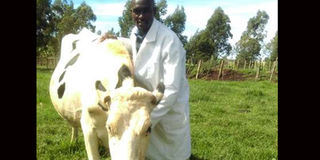Farm manager jobs galore for youths

Farm manager Victor Cheruiyot at Willens Dairy Farm in Uasin Gishu. PHOTO | RACHEL KIBUI | NATION MEDIA GROUP
What you need to know:
- Many dairy farmers are sceptical about hiring young managers, but at Willens Dairy Farm in Uasin Gishu County, Victor Cheruiyot, 25, is the manager.
- Farmers who cannot afford to employ full-time managers need to at least have a consultant.
- He started with a Certificate in General Agriculture and Community Development at the Bukura Agricultural College in Kakamega, then did another Certificate in Mushroom Production. He later did at the same college a Diploma in Animal Health Management; all the courses fro 2010 to 2013.
Many dairy farmers are sceptical about hiring young managers, but at Willens Dairy Farm in Uasin Gishu County, Victor Cheruiyot, 25, is the manager. He shares what it takes to do the job.
You are only 25. For how long have you been working as a manager?
Three years. And I have loved it especially because I work under a very understanding director.
What did you study in college?
I started with a Certificate in General Agriculture and Community Development at the Bukura Agricultural College in Kakamega, then did another Certificate in Mushroom Production. I later did at the same college a Diploma in Animal Health Management. I did the courses from 2010 to 2013.
What is your typical day like?
I start my day at 6am with checking on the 32 mature cows and some 23 calves to ensure they are all well. In case of any concerns, I inform the director and proper action is taken. I also monitor and keep records of milk production and other details. I also supervise feeding and assign duties to other workers who include trainees on internship and I mentor them.
When not at Willens farm, I consult for other dairy farms.
Would you encourage other people to take such a career?
Yes, it is a rewarding career I must say, but one must be passionate about it. So if someone listens to the inner voice that tells him to take up such a career, why not? Not only animal health and production, but generally, agricultural careers are basically exciting and have began to be lucrative.
When hiring you at 22, what did your boss say he liked about your work?
He said he would give me a chance to prove myself yet I was barely out of college. I believe I have proved my myself so far.
What are the grades needed to take the course and can one study up to university level?
It depends on institutions and the level. However, one needs to have performed well in agriculture and sciences at secondary school level. The course can be studied up to bachelor’s degree and beyond.
What are your plans in let us say five years?
I hope to someday establish a model farm with various agricultural sections for crops and livestock. I have the skills and knowledge and, thus, I believe it will be possible. The aim of this model farm will be to encourage people of all ages to venture into agriculture. This, I believe, will not only boost them economically, but also solve the food insecurity puzzle.
What do you love most about your job?
I feel great when passing knowledge to farmers who come here for training. I also like it when a cow successfully gives birth. The birth of a new calf feels like when a child is born in a family.
Anything you dislike about your work?
Sometimes I am faced with challenges like feeds shortage during the dry season, calf mortality especially during cold season and workers’ absenteeism or disappearance during working hours.
Farmers, especially those with good experience ignore the need to employ professional managers.
What is your take on this?
It is good to respect education and professionalism. Even those with a lot of experience go wrong when it comes to things like feeding and disease diagnosis. Farmers who cannot afford to employ full-time managers need to at least have a consultant.





